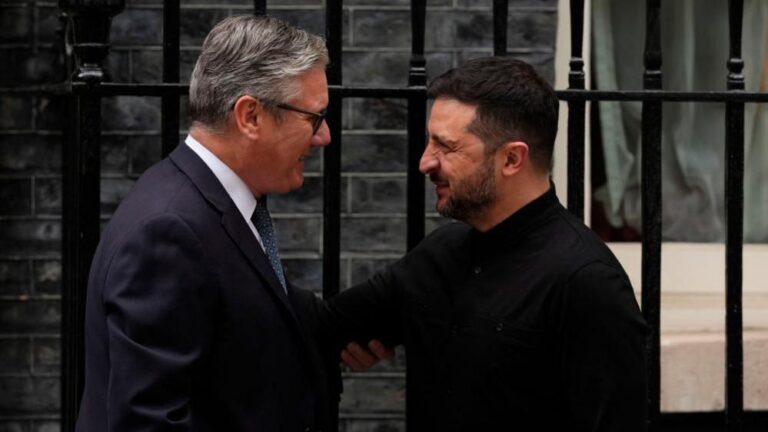Simon McDonald, The Guardian.
With so much at stake for Europe, the most important thing is to choose a lead speaker. I’d go with Starmer or Rutte.
Last week’s extraordinary summit meeting in Alaska is being followed today by an even more extraordinary international conference in Washington. None of the participants knew they were going to take part two days ago. In recent decades, diplomacy has been increasingly conducted in ad hoc contact groups – but the group of seven countries (the US, Ukraine, the UK, Germany, Finland, Italy and France) and two international organisations (Nato and the EU) has never met in this way before.
Officials will be preparing in the usual way, assembling briefing packs and writing talking points, aiming to please their bosses and, hopefully, allowing them to make the most effective intervention.
They should take a deep breath and think differently. The precedents of European Councils and Nato summits – and even Donald Trump bilaterals – are misleading enough to be actively unhelpful. As former colleagues from Washington to Kyiv, via London, Paris, Brussels, Rome, Berlin and Helsinki, prep their principals, I urge them to discard the traditional approach.
The usual format of each leader making a statement (however brief) just won’t cut it. There are three key groupings in the meeting – the US, Ukraine and Europe. Europe should have a single spokesperson. Most European participants might be prepared to concede to that approach, as long as their leader is the chosen one. But only two are really in the frame.
The meeting will be conducted entirely in English with an interpreter for Volodymyr Zelenskyy. But there will be only two native English speakers, with Keir Starmer as the only European. Two others have spoken English for so long that they count as near-native speakers: Finland’s president, Alexander Stubb, and Nato’s secretary general, Mark Rutte. Stubb represents the smallest participant, often an advantage when corralling bigger beasts, while Rutte represents Europe’s military alliance. The others speak well enough for most meetings but Trump’s quirkiness could wrong-foot them. Emmanuel Macron, Ursula von der Leyen, Friedrich Merz and Giorgia Meloni speak well enough to make any point they want to make, but not necessarily in the best way to make it. Trump takes offence easily.
So, Rutte or Starmer should speak for Europe. Whoever speaks needs to make their points without notes, look Trump in the eye, be prepared to be interrupted but disciplined enough not to lose the thread – and to resume their presentation when the president has subsided.
The European message needs to build on the Alaska summit. European publics and pundits have declared Vladimir Putin the winner, and poured scorn on Trump’s kowtowing and conspicuous lack of success; some politicians have joined in. Britons might think their government craven for seeing the meeting as the start of a promising initiative, but that’s really the only sensible diplomatic take.
The most promising result of the Anchorage summit was Trump’s conclusion that aiming for a ceasefire was not good enough; we need to move smartly to a full agreement. The Europeans could signal their willingness to play a full part in implementing such an agreement. That role, above everything else, will be providing concrete security guarantees. Putin is highly likely to reject that.
But what if the comprehensive agreement also had something important for him? Putin’s two key territorial requirements are the land bridge to Crimea and the whole of Donbas. He has the first but not the second.
Ukraine would hate giving up land that Russia has never conquered. But the aim here is peace, and peace always requires concessions. Ukraine has, of course, a great interest in ending the fighting. It wants to do that – with honour – and it wants no resumption.
The precedent is the winter war of 1939-40. At the outset, Finland looked completely outgunned by the Soviet Union. But, like the Ukrainians, they fought bravely. Like the Ukrainians, they did much better than any outsider predicted. But in the end, they ceded more land than the Soviets were occupying in order to make peace – 11% of their territory, including Karelia (inspiration for their national composer’s most famous piece of music).
In 1940, Finland had reason to fear that the Soviets would be back for more. Operation Barbarossa came to their rescue one year later, when the Soviet Union was the target of the biggest land invasion in history. In 2025, Ukraine needs something more immediate. Membership of Nato is the most obvious “something”.
Zelenskyy won’t like any of this. He would have to consult his cabinet and parliament before conceding any of it. But he would be able to outline the bare bones of a deal to bring to an end the bloodiest conflict in Europe since the end of the second world war, a prize worth taking.
Putin, too, wouldn’t like it. A Ukraine whose security is guaranteed by a power other than Moscow is inimical to him. But if Russia rejects an offer everyone else can grudgingly accept, Trump would see Putin for what he has been to date: the problem. He would have the knowledge and justification for upping the US’s contribution to Ukraine’s defence.
Today’s meeting in Washington is one of the oddest in modern diplomacy. But European leaders can turn oddness into opportunity.


